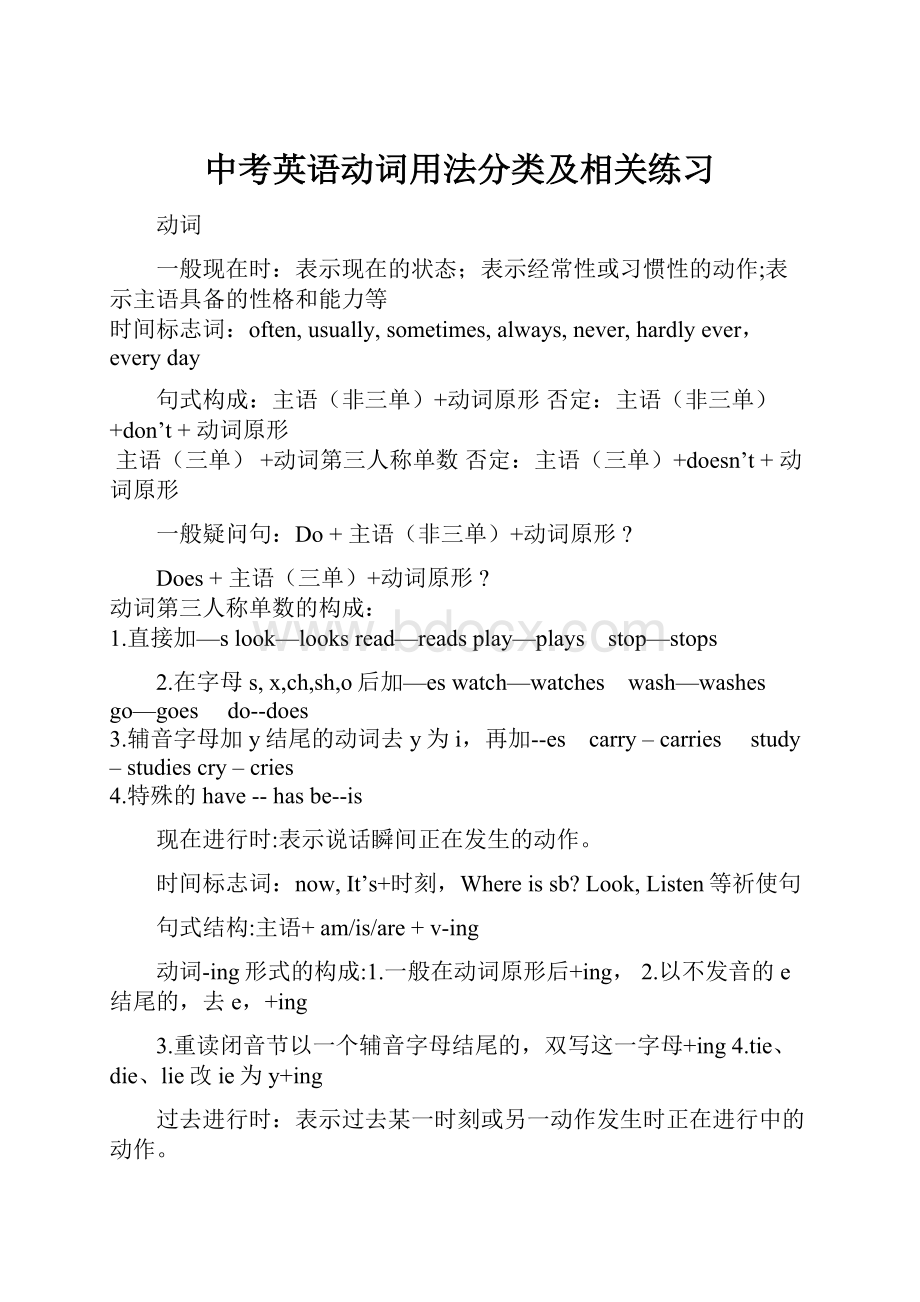中考英语动词用法分类及相关练习.docx
《中考英语动词用法分类及相关练习.docx》由会员分享,可在线阅读,更多相关《中考英语动词用法分类及相关练习.docx(23页珍藏版)》请在冰豆网上搜索。

中考英语动词用法分类及相关练习
动词
一般现在时:
表示现在的状态;表示经常性或习惯性的动作;表示主语具备的性格和能力等
时间标志词:
often,usually,sometimes,always,never,hardlyever,everyday
句式构成:
主语(非三单)+动词原形否定:
主语(非三单)+don’t+动词原形
主语(三单)+动词第三人称单数否定:
主语(三单)+doesn’t+动词原形
一般疑问句:
Do+主语(非三单)+动词原形?
Does+主语(三单)+动词原形?
动词第三人称单数的构成:
1.直接加—slook—looksread—readsplay—plays stop—stops
2.在字母s,x,ch,sh,o后加—eswatch—watches wash—washesgo—goes do--does
3.辅音字母加y结尾的动词去y为i,再加--es carry–carries study–studiescry–cries
4.特殊的have--hasbe--is
现在进行时:
表示说话瞬间正在发生的动作。
时间标志词:
now,It’s+时刻,Whereissb?
Look,Listen等祈使句
句式结构:
主语+am/is/are+v-ing
动词-ing形式的构成:
1.一般在动词原形后+ing,2.以不发音的e结尾的,去e,+ing
3.重读闭音节以一个辅音字母结尾的,双写这一字母+ing4.tie、die、lie改ie为y+ing
过去进行时:
表示过去某一时刻或另一动作发生时正在进行中的动作。
时间标志词:
过去的某一定点时刻(at+过去的时刻),then(=atthattime)(那时,当时),all+时间,“When…/While…/As…”等副词从句,etc.
句式结构:
主语+was/were+v-ing否定句:
主语+wasn’t/weren’t+v-ing疑问句:
Was/Were+主语+v-ing
现在完成进行时:
表示从过去某时开始到现在这一段时间里一直在延续的动作。
时间标志词:
since+过去时刻或一般过去时从句;for+一段时间;howlong(疑问句中用来提问since/for短语的)
句式结构:
主语+have/has+been+v-ing否定句:
主语+haven’t/hasn’t+been+v-ing
疑问句:
Have/Has+主语+been+v-ing
一般过去时:
表示过去发生的动作或出现的状态。
时间标志词:
yesterday,yesterdaymorning(afternoon,evening…),lastnight(week,month,year…)
twodaysago,aweekago,threeyearsago…,in1990,(in1998…),justnow等。
句式结构:
主语+v.过去式否定:
主语+didn’t+动词原形疑问句:
Did+主语+动词原形?
动词的过去式分为规则动词和不规则动词两种。
规则动词:
1.只要在动词词尾加上ed即可。
具体方法是一般情况直接加,如:
clean—cleaned;
2.词尾是不发音字母e的,可只加上d,如:
like—liked;
3.词尾为重读闭音节,结尾只有一个辅音字母的,应双写该辅音字母,再加上ed,如:
stop—stopped;
4.词尾为辅音字母加y的,应将y改为i再加上ed,如:
studystudied
5.不规则动词有其自己的变化形式,只能分别记忆。
一般将来时:
表示将来发生的动作或存在的状态,以及计划、安排、打算要做的事。
句式构成:
1.用现在进行时表一般将来时
常有“意图”,“安排”(但不是固定不变的)或“打算”的含义。
所用动词多是转移动词,如come,go,leave等:
2、begoingto结构
1).主语的意图,即将做某事。
2).计划,安排要发生的事。
3).有迹象要发生的事
陈述句:
主语+am/is/aregoingto+动词原形。
疑问句:
Am/Is/Are+主语+goingto+动词原形?
否定句:
主语+amnot/isn’t/aren’tgoingto+动词原形.
3.助动词shall/will+动词原形(当主语第一人称时,一般用shall,当主语为第三人称时,用will,但主语为第一人称时,也用will
肯定式:
主语+shall/will+动词原形+其他否定式:
主语+shall/will+not+动词原形+其他.
疑问式:
Shall/Will+主语+动词原形+其他简略回答:
Yes,主语+shall/will./No,主语+shall/will+not
缩写形式:
'll==shall/will
shan't==shallnot
won't==willnot
比较begoingto与will:
1)当说话人在做一个预测时,(他或她认为将来会发生或出现某种情况),will和begoingto都是可以用的.
2)表达一种事先计划或打算时(说话人打算在将来做某事因为在过去他或她已制定了一个计划或决定去做这件事),只能用begoingto.
3)表达意愿时,只能用will.
4).在有条件从句的主句中,一般不用begoingto,而多用will
一般将来时常见的标志词:
1).含tomorrow;next短语;2).in+段时间;3).howsoon;4).by+将来时间;
5).祈使句句型中:
or/andsb.willdo例Bequick,oryouwillbelate=Ifyoudon’tbequick,youwillbelate
6).在时间/条件状语从句中,如果从句用一般现在时,主句用将来时
现在完成时:
1.表示过去发生的动作对现在造成的影响或结果。
2.某个动作从过去已经开始,一直持续到现在,还有可能持续到将来.
时间标志词:
1.already(已经),just(刚刚),never(从未/从没有),ever(曾经),yet(仍然/还),before(以前(句尾时)2.since+点时刻或从句;for+段时间;howlong(疑问句中用来提问since/for短语的)
3.sofar;tillnow;bynow(到目前为止;迄今)
4.recently近来,inthepast/last+段时间在过去的几年中
5.once(一次),twice, three(four…)times
句式构成:
主语+have/has+v过去分词否定:
主语+haven’t/hasn’t+v过去分词疑问句:
Have/Has+主语+v过去分词
动词的过去分词分为规则动词和不规则动词两种
规则动词构成同过去式,.不规则动词有其自己的变化形式,只能分别记忆
动词的四种形式
1.动词的原形(do)2.动词第三人称单数(does)
3.动词-ing形式现在分词
(doing)动名词
4.动词的过去式(did)5.动词的过去分词(done)6.动词的不定式(todo)
非谓语动词:
动词的-ing
1.在进行时态中。
如:
1.HeiswatchingTVintheroom.2.Theyweredancingatnineo'clocklastnight.
2.在therebe结构中。
如:
Thereisaboyswimmingintheriver.
3.在havefun/problems结构中。
如:
WehavefunlearningEnglishthisterm.
Theyhadproblemsgettingtothetopofthemountain.
4.在介词后面。
如:
Thanksforhelpingme.Areyougoodatplayingbasketball?
What/Howaboutdoingsth?
做某事怎么样?
Iaminterestedinplayingfootball.
5.在以下结构中
(1)enjoydoingsth喜欢做某事
(2)finishdoingsth.完成做某事;(3)feellikedoingsth想要做某事;(4)stopdoingsth停止做某事(原来的事)(5)forgetdoingsth 忘记做过某事;(6)goondoingsth继续做某事(原来的事);(7)rememberdoingsth 记得做过某事;(8)likedoingsth 喜欢做某事(9)minddoingsth 介意做某事(10)find/see/hear/watchsbdoingsth发现/看到/听到/观看某人做(11)practicedoingsth 练习做某事;(12)bebusydoingsth 忙于做某事;(13)can'thelpdoingsth禁不住做某事;(14)keepdoingsth始终/一直做…(15)spend……(in)doingsth.花……做某事(16)haveagood/wonderful/greattimedoingsth.=havefundoingsth.做某事很快乐(17)haveahard/difficulttimedoingsth.费力地做某事,做某事处于困难之中(18)makealivingbydoingsth.做某事来谋生(19)“dosome+doing”短语如:
dosomeshopping/dosomewashing/dosomereading/dosomepracticing/dosomecleaning/dosomespeaking(20)“godoing”短语去做某事(主要指文娱活动等)如:
goshopping/gofishing/goswimming/gohiking/goskating/gocamping/goskiing(滑雪/goboating/gohunting(打猎)21.considerdoingsth.考虑做某事
6.动名词作主语
常见动词不定式词组、句型用法总结
.固定用法(非谓语动词):
以下是带to的动词不定式常见搭配
1.希望做某事hopetodosth.2.决定做某事decidetodosth.3.同意做某事agreetodosth.4.需要某人做某事needtodosth.5.使用某物做某事usesthtodosth6.迫不及待做某事can’twaittodo7.准备做某事get/bereadytodo8.尽力/努力做某事9.trytodosth10.计划做某事plantodosth.11.教某人做某事teachsb.todosth12.轮流做某事takeone’sturnstodosth.13.拒绝做某事refusetodosth.14.告诉某人做某事tellsb.todosth.15.请某人做某事ask/invitesb.todosth.16.希望某人做某事wishsb.todosth17.想要某人做某事want/wouldlikesb.todosth.18.同意某人做某事agreesb.todosth.19.不得不havetodo20.喜欢/想要某人做某事likesb.todosth.21.帮助某人做某事helpsb.todosth/helpsb.do22.鼓励某人做encouragesbtodo
★It’stime(forsb.)todosth.是某人做某事时候了例句:
It’stimeformetogohome.
★It’s+adj.for/ofsb.todosth.对于某人来说做某事是……(当adj.是表示性格、品德的形容词时用of)例句:
Itiseasyformetolearnitwell.Itisverykind/foolish/niceofyoutodoso.
★Ittakessb.sometimetodosth.某人做某事花了某时间例句:
1.Ittakesmeanhourtogettoschool
bybike.2.IttookmeanhourtowatchTVlastnight.3.Itwilltakehertwoweekstofinishthework.
★too+adj./adv.todosth.太…..而不能例:
Hewastoangrytosayaword.
★find/think/feelit+adj.todosth.发现/认为/感到做某事是…例:
Ifind/think/feelithardtolearnEnglishwell.
★序数词+todo第…..个做某事例句:
Whoisthefirsttogetthere?
★be+adj+todosth例句:
Iamverysorrytohearthat.
Iamreadytohelpothers.Iamhappy/pleased/gladtomeetyou.
★疑问词+todosthIdon’tknowwhattodo.
顺口溜:
本领最多不定式,主表定补宾和状;样样成分都能干,只有谓语它不敢;大家千万要小心,有时它把句型改;作主语时用it,自己在后把身藏;七个感官三使役,宾补要把to甩开;疑问词后接上它,宾语从句可充当;逻辑主语不定式,不定式前加forsb.;to前not是否定,各种用法区别开。
以下是不带to的动词不定式(即动词原形)的常见用法
★letsb.dosth让某人做某事★makesb.dosth使得某人做某事
★hearsb.sthdosth听见某人做某事★seesb.sthdosth看见某人做某事
whynot或whydon’tyou+动词原形?
为什么不….?
(表示建议)例:
Whynot/Whydon’tyoutakeawalk?
某人+hadbetter(not)do某人最好(不)做某事
情态动词can/may/must/should+动词原形(包括情态动词的否定形式+动词原形)
助动词do/does/did/will/would在构成疑问句或者构成否定句即don’t/doesn’t/didn’t/willnot/wouldnot+动词原形
begoingto+动词原形(表示“即将”“打算”做某事)
用所给动词的适当形式填空
1.Mother________(watch)TVeveryevening.
2.We________(talk)whentheteachercamein.
3.He________(go)toBeijingtwodaysago.
4.He________(leave)Chengduintwodays.
5.Look!
Theboy________(play)footballontheplayground.
6.Myuncle______(live)herefortenyears.
7.Heoftenhelpstheoldwoman_______(carry)water.
8.Wouldyouliketomakeacontributionto________(improve)ourlivingconditions?
9.Don’tforget________(turn)offthelightsbeforeyougoout.
10.Pleaseletthegirls_____(go)first.
11.Theyhadgreatfun________(play)footballthisafternoon.
12.Doyouenjoy________(watch)TV?
13.Wouldyoulike______(have)acupoftea?
14.Youcan______(go)theretomorrow.
15.Wouldyoumindmy_____(open)thedoor?
16.Pleaseaskhim_______(speak)moreloudly
17.I’llgofishingifit____(be)finetomorrow.
18.Hesaidhisgrandpa________(be)deadfortenyears.
19.Tellthechildren__________(notplay)inthestreet.
20.MrZhuspentmuchtime_________(help)mewithmyEnglish.
21.I’lltellyouassoonashe______-(come)back.
22.Eachofus_____(want)togotocollege.
23.Thankyoufor______(help)me.
24.Theteachertoldustheearth____(go)roundthesun.
25.Myfatherisgoodat_____(fish).
26.Acow_______(eat)grassbutgivesmilk.
27.Theteacherstopped_______(talk)touswhenwewentintotheoffice.
28.Isawher_______(cook)whenIgothome.
29.Look!
Awomanwithtwochildren_____(be)comingtowardsus.
30.Hisfamily___notbig,butthefamily____(be)interestedinmusic.
31.Twomonths_____(be)quitealongtime.
32.HeaskedifTom______(come)intwodays
33.Oneofourteachers_____(be)aforeigner.
34.TheGreens______(have)beentotheGreatWalltwice.
35.Heispracticing_______(speak)EnglishwithMr.Green.
36.Thispairofglasses___mine.Theglassesonthetable____his(be).
37.There____anapple,apearandsomebananasonthetable.(be)
38.______(read)inbed___(be)badyoureyes.
39.Hello,Jim!
I________(notknow)youweinChengdu.I______(tell)youwerestillinLondon.
41.Helefttheroomwithout_______(say)goodbye.
42.Theroomisdirty.I_______(clean)itinaminute.
43.Mary_______(sing)threesongsalready.Letherhavearest.
44.Itislateatnight.Dad_______still_______(work)atthedesk.
45.TellRoberttoturnoffthelightsbeforehe_______(go)out.
46.Heputonhisclothesand_______(hurry)toschoolwithoutbreakfast.
47.He_____(fall)and____(hit)hislegonatablethatday.
48.She__________(be)theretwicealready.
49.Whattime______Jim______(get)upeveryday.
50.Look!
Tom________(mend)thecaroverthere.
51.You____________(notsweep)theflooryesterday.
52.________(hold)onaminute,please!
I_______(look)forapieceofpapernow.
53.Ifyou_______(speak)tooloudlyinpublicplaces,otherpeople________(notbe)pleased.
54.“Thelightintheclassroom_______(be)on.”“Oh,sorry,Iforgot________(turn)itoff.”
55.“Howabout_______(take)ashortrest?
”“Sorry,Ifeellike_______(watch)TVaftersupper.”
56.________(notworry).He’llcomebacksoon.
57.________Februaryusually________(have)28days?
58.______you________(wait)forabusnow?
59.We________(notgo)climbingthehillsifitrainstomorrow.
60.Thebesttime__________(plant)treesisinspring.
6